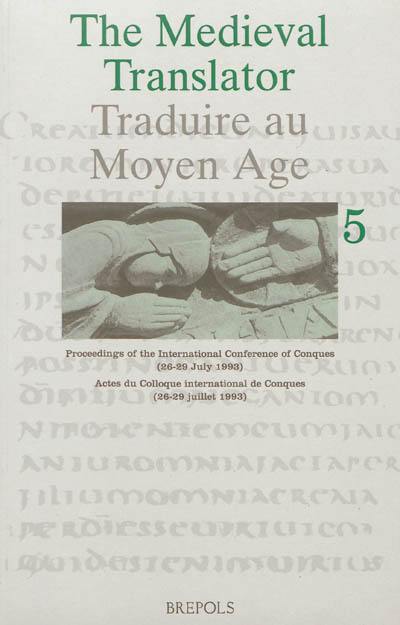
Fiche technique
Format : Broché
Nb de pages : XVI-488 pages
Poids : 400 g
Dimensions : 15cm X 23cm
ISBN : 978-2-503-50448-3
EAN : 9782503504483
Proceedings of the international Conference of Conques
26-29 July 1993
Quatrième de couverture
Religieux, profane, érudit, populaire, autant de domaines de la traduction médiévale abordés ici dans le détail. Aux nombreux textes de traducteurs médiévaux bien connus, dont Marie de France, Jean de Vignay, Philippe de Mézières, Geoffrey Chaucer et William Caxton, viennent s'ajouter des traductions anonymes : un récit vieil-anglais de la Chute (Genesis B), des poèmes de troubadours en ancien français, une version en moyen haut-allemand des Visiones Georgii, et, en moyen-anglais, des traductions de romans en ancien français, ainsi que de poèmes et autres textes spirituels d'origine latine. La traduction post-médiévale est elle aussi présente, avec le Français Bussy-Rabutin (17ème s.), les traducteurs anglais de Boèce (17ème et 18ème s.) et les modernisations de Chaucer au 18ème siècle. Des antécédents classiques de la traduction médiévale (le Platon latin) aux réappropriations modernes de la littérature classique et médiévale, profane ou mystique (Cicéron, Villon, Ruusbroec), c'est un éventail très large qui est ici offert, et qui inclut des considérations de tempérament personnel, de géographie, de politique, voire d'identité nationale. Le lecteur est également invité à voir dans l'acte même de la traduction une activité multiple pour laquelle les communications entendues à Conques ont proposé de nombreuses métaphores ; traduire un texte est en quelque sorte fournir une relique que l'on peut toucher, quand ce n'est pas dérober ; mais traduire est aussi entrer en dialogue, passer des frontières, sacrifier, offrir, et parfois même, par amour, trahir.
Sous le titre The Medieval translator sont regroupées depuis quelques années des communications traitant des divers aspects théoriques et pratiques de la traduction au Moyen Age. Ces études rejoignent d'autres publications et travaux apparentés, tels que ceux de J. Beer, R. Copeland, G. Contamine, J. Hamesse et M. Fattori. Le colloque de Conques (1993) fait suite aux trois colloques de Cardiff ; conçues dès leur origine comme lieux d'échanges et de pluridisciplinarité, ces rencontres internationales attirent depuis 1987 des spécialistes de la traduction, non seulement de textes anciens et médiévaux en langues vernaculaires médiévales, mais aussi de textes médiévaux en langues modernes. A l'oeuvre entre l'auteur et le lecteur, le traducteur d'aujourd'hui, comme celui d'hier, exerce une fonction vitale ; traduire au Moyen Age, et traduire le Moyen Age, restent deux aspects d'une même entreprise.
The heart of this volume is the thorough study of many medieval translations of a whole variety of texts, religious and secular, learned and popular. Many named medieval translators appear in the volume, including Marie de France, Jean de Vignay, Philippe de Mézières, Geoffrey Chaucer and William Caxton. Anonymous translations include an Old English account of the Fall, Genesis B ; Old French versions of troubadour lyrics ; a Middle High German version of the Visiones Georgii ; and, in Middle English, translations of romances from Old French and of religious lyrics and other religious writings from Latin. Post-medieval translation is represented by essays on the seventeenth-century Frenchman Bussy Rabutin, by English translators of Boethius in seventeenth- and eighteenth-century England, and by eighteenth-century English modernisations of Chaucer. The classical antecedents of medieval translation figure in an essay on Latin versions of Plato up to the twelfth century. The twentieth-century recuperation of classical and medieval literature appears in essays on modern versions of the Testament of François Villon, of rhetorical treatises by and associated with Cicero, and of medieval mystical literature. The volume is framed by papers which widen the focus of study to consider the ways in which translation intersects with wider issues of geography, gender, politics, and national identity. Lastly, the volume provides a number of new and suggestive metaphors for the act of translation ; translation as theft ; as a form of contact relic ; as an act of betrayal (the translator selling one culture short for the sake of another) ; as an act of sacrifice ; as a dialogue ; as a relation of interchangeability.
The Medieval Translator is an ongoing series of papers heard at the Cardiff Conferences on the Theory and Practice of Translation in the Middle Ages (1987-) ; it supplements other publications in the field like those of Beer, Copeland and Contamine. From the beginning the Conference has favoured an interdisciplinary approach to the subject, and has welcomed contributions not only on the translation of texts into medieval vernaculars (or, in the words of our French title, « traduire au Moyen Age ») but also on the modern translation of medieval texts and the wider question of our appreciation and understanding of the Middle Ages (« traduire le Moyen Age »). Consequently, it may be readily perceived that, as with previous volumes in the series - and as with the Conferences at which they originated - this volume is greater than the sum of its parts.





